If you’re looking to boost your email marketing success in 2025, I recommend exploring some of the top strategy books out there. Titles like *Content Chemistry*, *Email Marketing Rules*, and *Email Strategy Domination* provide practical frameworks, checklists, and actionable tips to elevate your campaigns. They cover everything from building your list to creating engaging content and optimizing automation. Keep exploring these resources, and you’ll discover even more ways to transform your email marketing efforts.
Key Takeaways
- These books provide foundational principles, practical tactics, and advanced frameworks to enhance email marketing effectiveness in 2025.
- They cover everything from list building and segmentation to automation and long-term subscriber engagement strategies.
- The resources include real-world case studies, checklists, and visual tools for practical implementation and campaign optimization.
- Emphasizing authentic, relationship-driven messaging helps foster trust and loyalty with your email audience.
- They cater to marketers of all skill levels, offering insights to boost ROI and adapt to evolving industry trends.
Digital Marketing Book: Mastering Strategy, AI, and Customer Growth
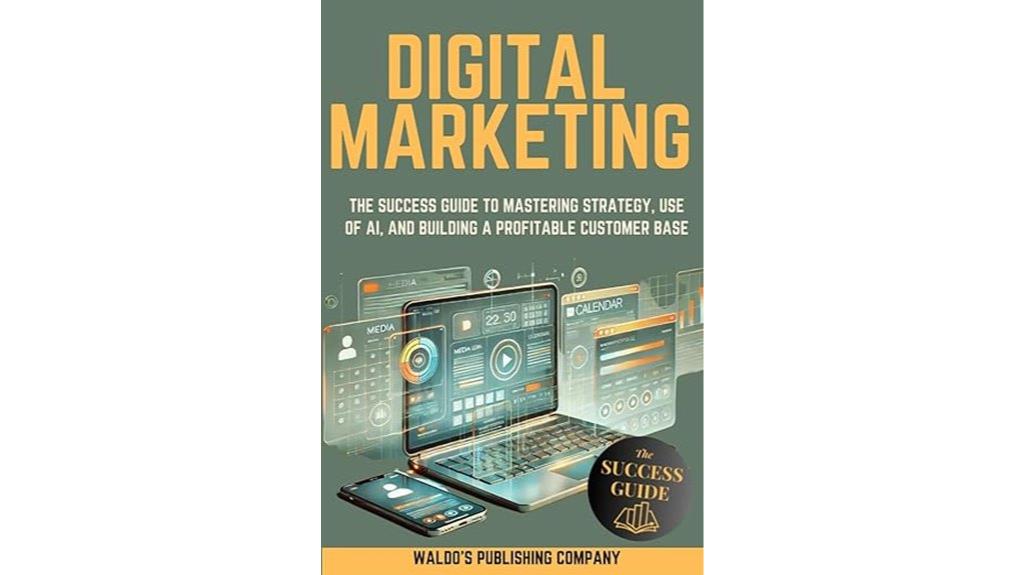
If you’re looking to build a solid foundation in digital marketing, “Digital Marketing Book: Mastering Strategy, AI, and Customer Growth” is an excellent choice, especially for small business owners, beginners, or anyone seeking to refresh their skills. This all-encompassing guide simplifies complex concepts like SEO, social media, and analytics, making them accessible and practical. It emphasizes creating effective strategies by setting goals, identifying target audiences, and leveraging AI tools for campaign optimization. With real-world examples and actionable tips, it helps you develop coherent plans that boost engagement, retain customers, and grow your business, all while staying current with industry trends.
Best For: small business owners, beginners, or anyone looking to strengthen their digital marketing skills and stay updated with industry trends.
Pros:
- Simplifies complex digital marketing concepts making them accessible for all skill levels
- Provides practical strategies, real-world examples, and actionable tips for implementation
- Emphasizes the integration of AI and data analytics to optimize campaigns and personalize customer experiences
Cons:
- Some readers may desire more specific AI tools, prompts, or advanced technical guidance
- Focuses primarily on foundational concepts, which might limit depth for experienced marketers
- As a comprehensive guide, it may require time investment to absorb all strategies and insights
300 Email Marketing Tips: Strategies to Grow Your Business

Looking to grow your business through email marketing? “Email Marketing Strategy Books” is an excellent resource for both beginners and experienced marketers who want clear, actionable tips. I recommend Meera Kothand’s approach, which simplifies complex concepts into manageable steps. Focus on building your list with compelling lead magnets, crafting targeted campaigns, and nurturing subscribers through automation. She emphasizes creating content calendars and refining email sequences to boost engagement. Implementing these strategies helps develop stronger relationships, increase loyalty, and drive revenue. With her practical advice, you’ll gain confidence and clarity, turning your email list into a powerful growth engine for your business.
Best For: marketers of all levels seeking clear, actionable strategies to grow their email lists, increase engagement, and drive revenue through effective email marketing practices.
Pros:
- Provides practical, step-by-step guidance suitable for both beginners and experienced marketers.
- Emphasizes creating manageable, incremental improvements that lead to long-term success.
- Includes free resources like workbooks to enhance learning and implementation.
Cons:
- Some readers may find the content too basic if they are already advanced in email marketing.
- Requires ongoing effort and consistency to see significant results, which may be challenging for busy entrepreneurs.
- The focus on simplicity might overlook some advanced automation and segmentation tactics for seasoned users.
Email Marketing Rules: Frameworks & Checklists
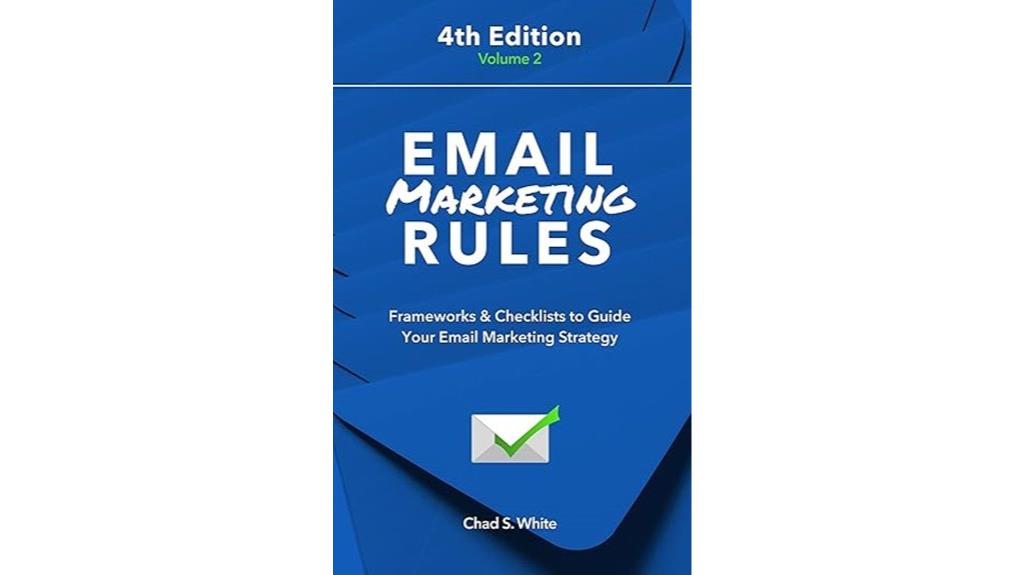
Anyone seeking a structured approach to mastering email marketing will find Chad White’s “Email Marketing Rules” books especially valuable. These guides offer practical frameworks, checklists, and real-world examples that help you implement effective strategies quickly. White’s expertise shines through in detailed advice on crafting subscriber journeys, optimizing send times, segmentation, permissions, and lifecycle management. Volume 2 builds on the basics with deeper insights and forward-looking tactics, making complex concepts accessible. Whether you’re a beginner or a seasoned pro, these books serve as essential reference tools, keeping your campaigns aligned with industry best practices and future trends.
Best For: marketers of all experience levels seeking a practical, structured approach to improve and innovate their email marketing strategies.
Pros:
- Provides comprehensive frameworks, checklists, and real-world examples for effective implementation.
- Offers in-depth insights into subscriber journey management, segmentation, and future trends.
- Highly valued as an accessible, practical reference for ongoing campaign success.
Cons:
- Some readers note minor typos and overlaps between volumes.
- The detailed content may be overwhelming for complete beginners without prior marketing knowledge.
- Focuses heavily on strategic frameworks, which may require adaptation for specific industry needs.
Email Marketing Blueprint: Build Your List Fast and Turn Emails Into Income
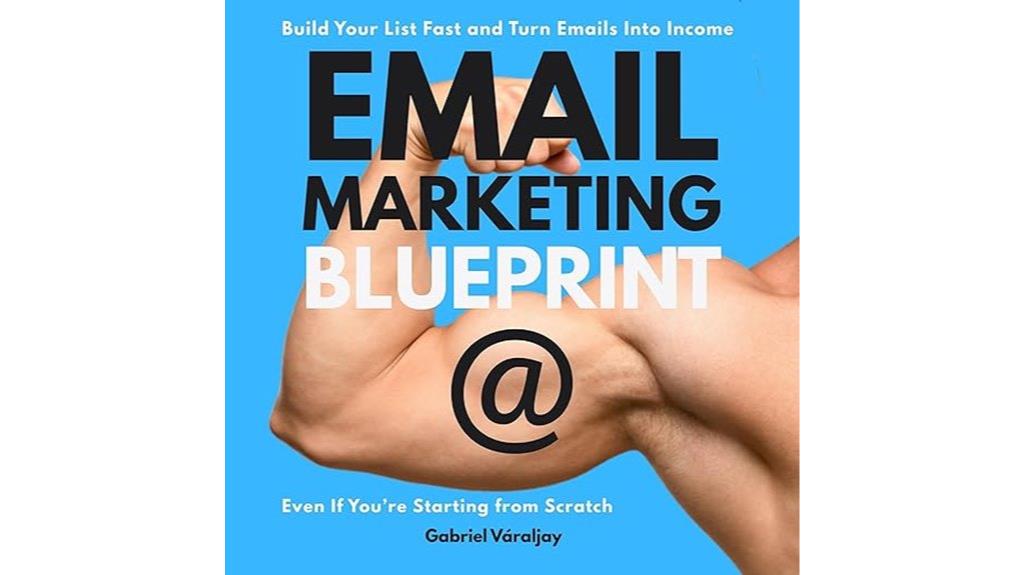
The “Email Marketing Blueprint” is an ideal resource for beginners and seasoned marketers alike who want to rapidly grow their email lists and turn their emails into reliable income streams. It offers straightforward strategies for building your list quickly through segmentation, personalization, and automation, making it accessible even with minimal resources. The book emphasizes creating genuine relationships by offering value, respecting privacy, and complying with legal standards worldwide. It also provides practical tools, case studies, and tips for monetizing campaigns effectively. Whether you’re starting out or looking to refine your approach, this blueprint helps you turn email marketing into a powerful revenue channel.
Best For: small business owners, SaaS founders, solo creators, and non-profits looking to quickly build their email lists and generate income through effective email marketing strategies.
Pros:
- Provides clear, step-by-step frameworks suitable for both beginners and experienced marketers
- Emphasizes ethical practices, privacy, and legal compliance for international campaigns
- Includes practical tools, case studies, and real-life examples to enhance implementation
Cons:
- May require ongoing effort to maintain consistency and engagement over time
- Some advanced features or automation techniques might need additional resources or expertise
- The focus on quick list-building might be less suitable for highly niche or slow-growth markets
Email Marketing Guide: Write Engaging Emails Your Subscribers Will Love

If you’re tired of pushy sales tactics and crave authentic connections with your audience, this email marketing guide is exactly what you need. Bobby Klinck emphasizes ethical, relationship-focused communication, treating subscribers as real people. He shares practical tips on craftingsubject lines, storytelling, and using humor to make your emails feel personal and genuine. His straightforward, conversational style makes the process enjoyable and memorable. Instead of manipulation, he encourages building trust and loyalty through honesty and personality. This approach not only boosts engagement but also fosters long-term relationships, making your email campaigns more effective and authentic in 2025.
Best For: entrepreneurs, business owners, and marketers seeking ethical, relationship-driven email strategies to build genuine connections and foster loyalty.
Pros:
- Emphasizes authentic, relationship-focused communication over salesy tactics
- Provides practical, actionable tips with real-life examples and storytelling techniques
- Engaging, humorous, and conversational style that makes learning enjoyable and memorable
Cons:
- May be too informal or lengthy for readers preferring concise content
- His emphasis on storytelling might not suit all niches, such as fiction writing
- Some may find the adult humor and self-deprecating tone less suitable for professional environments
Content Chemistry 7th Edition: Handbook for Content Marketing

Looking for a practical guide that bridges foundational content marketing principles with real-world application? Content Chemistry 7th Edition is exactly that. It emphasizes core concepts like audience empathy, clear structure, and analytics, ensuring you build a solid strategy before diving into advanced tactics. The book offers frameworks, step-by-step examples, and visual tools to develop your skills—from keyword research to social proof. It also highlights AI’s role as a strategic partner, fostering critical thinking. Most importantly, it stresses building trust and relationships with your audience, which is key to sustainable success. This resource is invaluable whether you’re starting out or refining your content marketing approach.
Best For: marketing managers, content creators, and teams seeking a practical, foundational guide to building sustainable, effective content marketing strategies.
Pros:
- Provides clear frameworks, visual tools, and step-by-step examples for practical skill development.
- Emphasizes core principles like audience empathy, trust, and analytics for long-term success.
- Integrates AI thoughtfully as a strategic partner to enhance research and content strategies.
Cons:
- Some users may find the print quality issues, such as faded images and text, distracting.
- Experienced marketers might desire more advanced, specialized frameworks beyond fundamentals.
- The focus on core principles may be less suited for those seeking quick, tactical shortcuts.
How to Write Effective Sales Emails

Are you an internet or affiliate marketer aiming to boost your email sales quickly? I’ve found that writing effective sales emails is about simplicity and focus. This concise guide offers clear templates and proven techniques that improve open and click-through rates—some users doubled their engagement. It emphasizes punchy subject lines, direct messaging, and strong calls-to-action, making it easy to craft emails that convert. Although geared toward affiliate marketers, the principles are adaptable across niches. By applying these straightforward strategies, you’ll see immediate results, like more responses and higher sales. It’s a quick, practical resource to elevate your email game in no time.
Best For: internet and affiliate marketers seeking quick, effective email strategies to increase open rates, click-throughs, and sales.
Pros:
- Provides clear templates and straightforward techniques that deliver immediate results
- Emphasizes simplicity, making it easy for beginners to implement and see improvements
- Focuses on proven methods like engaging subject lines and compelling calls-to-action
Cons:
- Mainly tailored to affiliate and internet marketing niches, limiting applicability elsewhere
- Assumes familiarity with marketing terminology, which may confuse complete beginners
- Emphasizes short, punchy emails, potentially limiting options for more nuanced storytelling or long-form copy
Email Marketing Rules: Checklists, Frameworks, and 150 Best Practices for Business Success
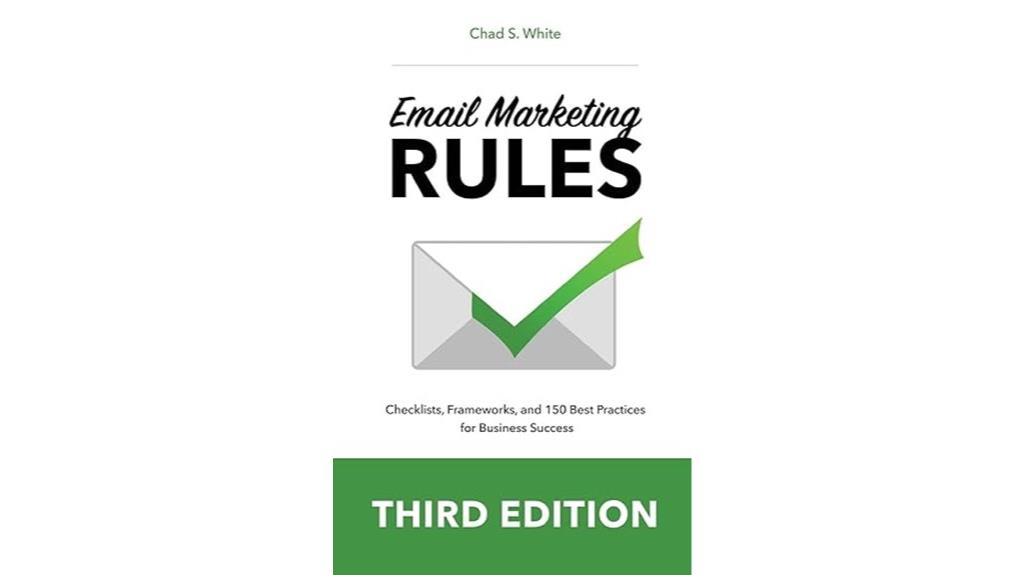
Email Marketing Rules stands out as an essential resource for both newcomers and seasoned marketers who want a practical, easy-to-follow guide. This book by Chad White compiles 150 best practices, checklists, and frameworks that cover every aspect of email marketing, from list growth to deliverability. It emphasizes the importance of understanding user behavior, adapting tactics to changing algorithms, and mastering email’s interdisciplinary nature. Whether you’re building campaigns or refining strategies, the book offers clear insights and actionable steps. Its timeless advice helps you navigate the evolving landscape, ensuring your email efforts remain effective and aligned with business success.
Best For: marketers, business owners, and students seeking a comprehensive, practical guide to mastering email marketing strategies and best practices.
Pros:
- Offers 150 actionable best practices, checklists, and frameworks for comprehensive coverage.
- Clear, straightforward language makes complex topics accessible to all skill levels.
- Emphasizes adaptability and best practices for evolving algorithms and user behaviors.
Cons:
- As a broad reference, it may lack in-depth detail on highly specialized topics.
- Some readers might find the extensive content overwhelming without prior marketing experience.
- The focus on foundational principles may require supplementary resources for advanced tactics.
The Cold Email Manifesto Book
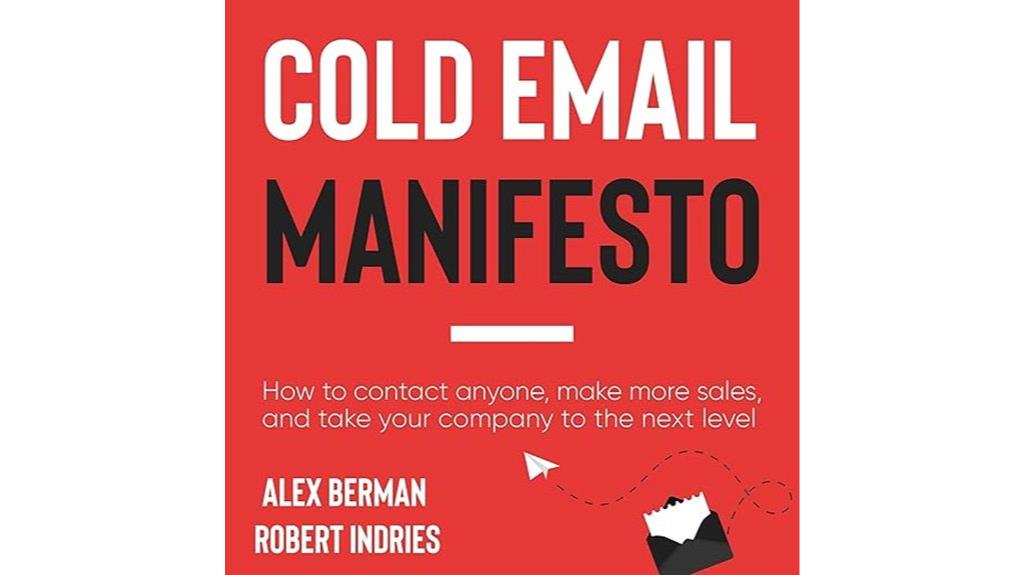
If you’re a small business owner or sales professional enthusiastic to boost outreach without relying on large audiences or hefty ad budgets, The Cold Email Manifesto Book offers practical, proven strategies tailored for you. It highlights effective techniques like personalized, concise messages, strong value propositions, and social proof that really work. The book covers everything from technical setup to crafting compelling emails, making it accessible even for beginners. I found it inspiring and straightforward, with step-by-step guidance that’s easy to follow. It emphasizes consistency, measurement, and discipline—key to turning cold emails into a scalable, sustainable outreach method.
Best For: small business owners and sales professionals seeking practical, scalable cold email strategies to generate leads without large audiences or ad budgets.
Pros:
- Provides clear, actionable steps backed by real-world results.
- Suitable for beginners with detailed technical setup guidance.
- Emphasizes consistency, measurement, and discipline for sustainable outreach.
Cons:
- Some chapters may feel repetitive, though they reinforce core concepts.
- The focus on fundamentals might seem basic for advanced marketers.
- Limited focus on other outbound channels beyond cold email.
Email Marketing Strategy Domination

Looking to master email marketing strategies quickly and effectively? “Email Marketing Strategy Domination” is the perfect resource for marketers at any skill level who want straightforward, actionable guidance. This book breaks down complex tactics into simple, practical steps you can implement right away. Its clear language and real-world case studies make it accessible and valuable, whether you’re starting fresh or refining your approach. Focused on results, it helps you create professional email campaigns, boost engagement, and improve ROI. If you want to dominate your email marketing game, this book delivers proven strategies to elevate your success.
Best For: marketers of all experience levels seeking clear, actionable strategies to quickly improve their email marketing results and ROI.
Pros:
- Provides straightforward, easy-to-understand guidance suitable for beginners and experienced marketers alike
- Includes practical steps and real-world case studies that can be implemented immediately
- Focuses on results-driven strategies to boost engagement, conversions, and long-term customer relationships
Cons:
- May lack in-depth theoretical analysis for those seeking advanced or highly technical email marketing tactics
- Some readers might find the step-by-step instructions too simplified for complex campaigns
- As a practical guide, it may require supplementary resources for highly specialized or niche marketing needs
Content Chemistry, 6th Edition: Illustrated Guide to Content Marketing
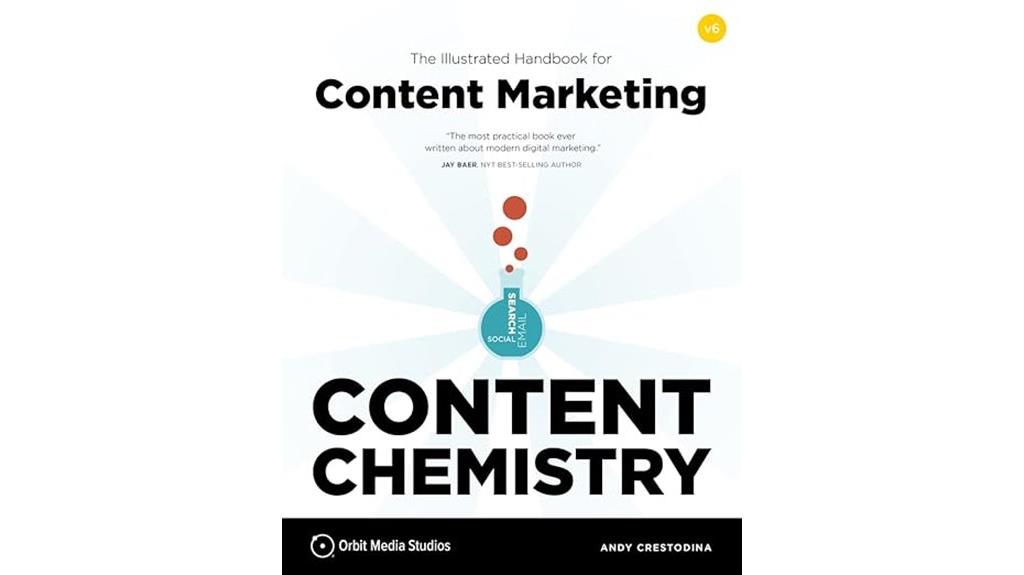
Are you seeking a thorough resource that bridges foundational principles with practical tactics in content marketing? Content Chemistry, 6th Edition, is exactly that. It covers strategies, frameworks, and principles essential for digital success, emphasizing audience-aligned content, SEO, social media, and performance measurement. The book offers clear examples, diagrams, and layouts, making complex ideas easy to grasp and implement. It combines insights from psychology, data analysis, and digital marketing, making it suitable for beginners and pros alike. Staying current is crucial, and this edition provides fresh, industry-relevant strategies to help you build long-term brand authority and achieve sustainable growth.
Best For: Digital marketers, content managers, and industry professionals seeking a comprehensive, up-to-date guide to building sustainable content strategies and boosting brand authority.
Pros:
- Offers clear, practical frameworks and real-world examples that enhance understanding and application
- Combines insights from psychology, data analysis, and digital marketing for a well-rounded approach
- Includes diagrams, charts, and layouts that facilitate easy navigation and quick reference
Cons:
- Some users have experienced logistical issues such as damaged copies upon delivery
- The detailed content may be overwhelming for complete beginners without prior marketing knowledge
- Staying current requires purchasing the latest edition, which may involve additional costs
Email Marketing Mastery System for Building a Raving Fan Email List

The “Email Marketing Mastery System” is an ideal resource for beginners and intermediate marketers who want to quickly build a loyal, engaged email list. It emphasizes that email marketing remains one of the most effective tools for growth and customer engagement. The book guides you through setting up quality lists, creating compelling landing pages, and driving traffic using tools like autoresponders. It stresses authenticity, providing value, and crafting simple yet persuasive email sequences. Whether you’re starting fresh or revitalizing your approach, this system offers practical, actionable steps to turn subscribers into raving fans and boost your business success in 2025.
Best For: beginners and intermediate marketers seeking practical, actionable strategies to build and engage a loyal email list for business growth in 2025.
Pros:
- Clear, easy-to-follow guidance suitable for newcomers and those with some experience
- Focus on authenticity and providing value to foster genuine subscriber engagement
- Includes practical tips, checklists, and resources to streamline implementation
Cons:
- May offer limited new insights for advanced marketers with extensive experience
- Content remains foundational, possibly lacking in highly advanced tactics
- Some users might find the technical explanations basic if they already have familiarity with email marketing tools
Factors to Consider When Choosing Email Marketing Strategy Books

When choosing an email marketing strategy book, I focus on how relevant the content is to my goals and industry. I also consider whether the strategies are practical and easy to implement, and if the author has credible expertise. Finally, I look for books that reflect current trends and fit my target audience’s needs to make sure I get the most value.
Content Relevance
Choosing the right email marketing strategy book starts with ensuring its content matches your current knowledge level and marketing goals. I look for books that address the latest trends, tools, and regulations to stay current. It’s important that the material covers specific areas I want to improve, like automation, segmentation, or copywriting, so I can directly apply what I learn. I also verify that the strategies and examples are relevant to my industry or niche, ensuring practical implementation. Additionally, I prioritize books that include recent case studies and data-driven insights, as these reflect current industry standards. This focus on content relevance helps me choose resources that are both practical and aligned with my growth objectives, making my learning more effective and immediately applicable.
Practical Application
Focusing on practical application is key when selecting an email marketing strategy book because it guarantees that the concepts I learn can be directly implemented in real-world situations. I look for books that offer actionable frameworks, checklists, and step-by-step guides, as these help me systematically execute tactics and track results effectively. Including case studies and examples from diverse contexts enhances my understanding and adaptability. Resources like worksheets, templates, and tutorials give me hands-on practice, reinforcing what I’ve learned. A focus on practical tips and proven techniques minimizes unnecessary theory, allowing me to quickly apply new knowledge and see tangible improvements. Ultimately, a book with a practical approach ensures I can turn strategies into measurable results swiftly and confidently.
Author Expertise
How can I guarantee that the advice I follow in an email marketing strategy book is trustworthy? I look for authors with proven expertise—those with years of experience, industry recognition, and a strong track record. They often include real-world case studies, actionable tips, and examples that show they’ve successfully implemented strategies themselves. An expert who updates their book regularly shows they stay current with industry trends, regulations, and technology. I also check their professional background, contributions to respected publications, and peer endorsements to verify credibility. When the author has deep knowledge of email marketing principles, I feel more confident their insights are nuanced, reliable, and relevant to today’s dynamic landscape. This ensures I’m learning from the best to boost my campaigns effectively.
Up-to-Date Strategies
Have you ever wondered if the email marketing books you’re reading stay current with today’s digital landscape? Staying updated means choosing books that cover the latest privacy laws like GDPR and CCPA, ensuring your campaigns are compliant and ethical. Modern books also highlight how AI and automation can personalize messages and boost engagement. They focus on leveraging new platforms and features, such as interactive emails and AMP technology, to make subscriber interactions more dynamic. The best resources reflect a shift towards building meaningful relationships and delivering value, rather than just growing lists. Additionally, up-to-date books include data-driven insights and real-world case studies, showing how contemporary techniques succeed in a fast-changing environment. These elements are essential for crafting effective, compliant, and innovative email strategies today.
Target Audience Fit
Choosing the right email marketing strategy book depends heavily on your specific needs and skill level. You want a book that matches your experience—whether you’re just starting out or looking to refine advanced techniques—so the content feels relevant and practical. Consider whether the target audience described aligns with your business type, industry, or niche; strategies effective for e-commerce might not suit a B2B service. Also, check if the book emphasizes relationship-building, automation, or technical tactics that fit your marketing goals. The language and style should resonate with your preferred learning approach, whether it’s formal, casual, or technical. Finally, ensure it covers your primary channels, like list growth, segmentation, or automation, to align with your strategic focus.
Depth of Information
Ever wondered what sets a truly thorough email marketing strategy book apart? It’s the depth of information it provides. A solid book dives into core concepts like segmentation, automation, and list growth with detailed explanations. Look for titles that include frameworks, checklists, and real-world examples to help you implement strategies effectively. Advanced topics such as deliverability, lifecycle management, and compliance should also be covered to guarantee a comprehensive understanding. Actionable steps, case studies, and data-driven insights signal a depth that benefits both beginners and seasoned marketers. Avoid books that only skim the surface with generic tips. Instead, choose ones that explore the nuances and complexities of email marketing, equipping you with the knowledge to optimize your campaigns thoroughly.
Visual Clarity
When selecting an email marketing strategy book, visual clarity plays a pivotal role in how effectively you’ll absorb and apply the information. Well-designed diagrams, charts, and layouts help you grasp complex concepts quickly, reducing mental overload. Clear visual aids highlight essential points using color coding, icons, and infographics, which boost retention and recall. These visuals cater to different learning styles, especially visual learners who benefit from graphical representations. Additionally, high-quality images and readable typography enhance the overall user experience, making the book more engaging and easier to reference repeatedly. As a result, books with strong visual clarity not only simplify learning but also encourage deeper engagement, helping you implement strategies more confidently and efficiently in your campaigns.
Cost and Accessibility
Evaluating the cost and accessibility of email marketing strategy books is essential to guarantee you get the best value for your investment. I recommend checking if the book offers a free sample or preview so you can assess its relevance before buying. Also, consider if it’s available in multiple formats—hardcover, paperback, e-book, or audiobook—to suit your learning style and budget. Comparing the price to the content’s depth and practicality helps ensure you’re getting good value. If the book is part of a subscription or online library, it could save you money, especially if you plan to read more titles. Ultimately, look for language options or adaptations for different skill levels to make sure it’s accessible and tailored to your needs.
Frequently Asked Questions
How Do These Books Address Emerging AI Trends in Email Marketing?
You’re wondering how these books tackle emerging AI trends in email marketing. I’ve found they often highlight the importance of AI-powered personalization, automation, and data analysis. They teach us how to leverage AI tools to craft targeted messages, improve engagement, and optimize campaigns efficiently. These books also explore future AI innovations, helping us stay ahead of the curve and adapt strategies as technology continues to evolve.
Do the Strategies Cater to Small Businesses or Enterprise-Level Campaigns?
I believe these strategies actually cater to both small businesses and enterprise-level campaigns. From my research, many books emphasize scalable techniques that can be tailored to any size operation. Small businesses benefit from cost-effective, personalized tactics, while larger organizations leverage advanced automation and data analytics. So, no matter your company’s size, you’ll find practical, adaptable advice that fits your needs and helps you grow your email marketing success.
Are There Case Studies Demonstrating Successful Implementation of These Tactics?
You’re curious if there are case studies that show these tactics really work. I’ve found that many top books include detailed examples from real companies, highlighting their successes and lessons learned. These case studies help me understand how to adapt strategies to my own campaigns. They’re practical, relatable, and give me confidence that applying these tactics can lead to tangible results in my email marketing efforts.
How Do These Books Balance Technical Strategies and Creative Content?
Sure, I’ll tell you—these books somehow manage to make tech talk and creative flair dance together. It’s like a recipe where data meets storytelling, and they blend seamlessly. I love how they don’t just dump algorithms but also sprinkle in inspiring examples. Honestly, they keep me hooked, showing that you can master the nuts and bolts without losing your creative spark. It’s a perfect balance I wish I’d known earlier.
What Metrics Do These Books Suggest for Measuring Email Marketing Success?
When measuring email marketing success, I focus on key metrics like open rates, click-through rates, and conversion rates. These books suggest tracking bounce rates and unsubscribe rates too, to gauge list health. I also pay attention to ROI, ensuring my campaigns are financially effective. By analyzing these metrics regularly, I can tweak my strategies for better engagement and results, making sure every email counts.
Conclusion
Whether you’re mastering strategy, crafting engaging content, or building your list, these books cover it all. They inspire, inform, and ignite your email marketing journey. They challenge you to plan better, write smarter, and grow faster. So, explore into these resources, implement what you learn, and watch your campaigns soar. Because the right books don’t just teach—you transform, elevate, and empower your email marketing success.










